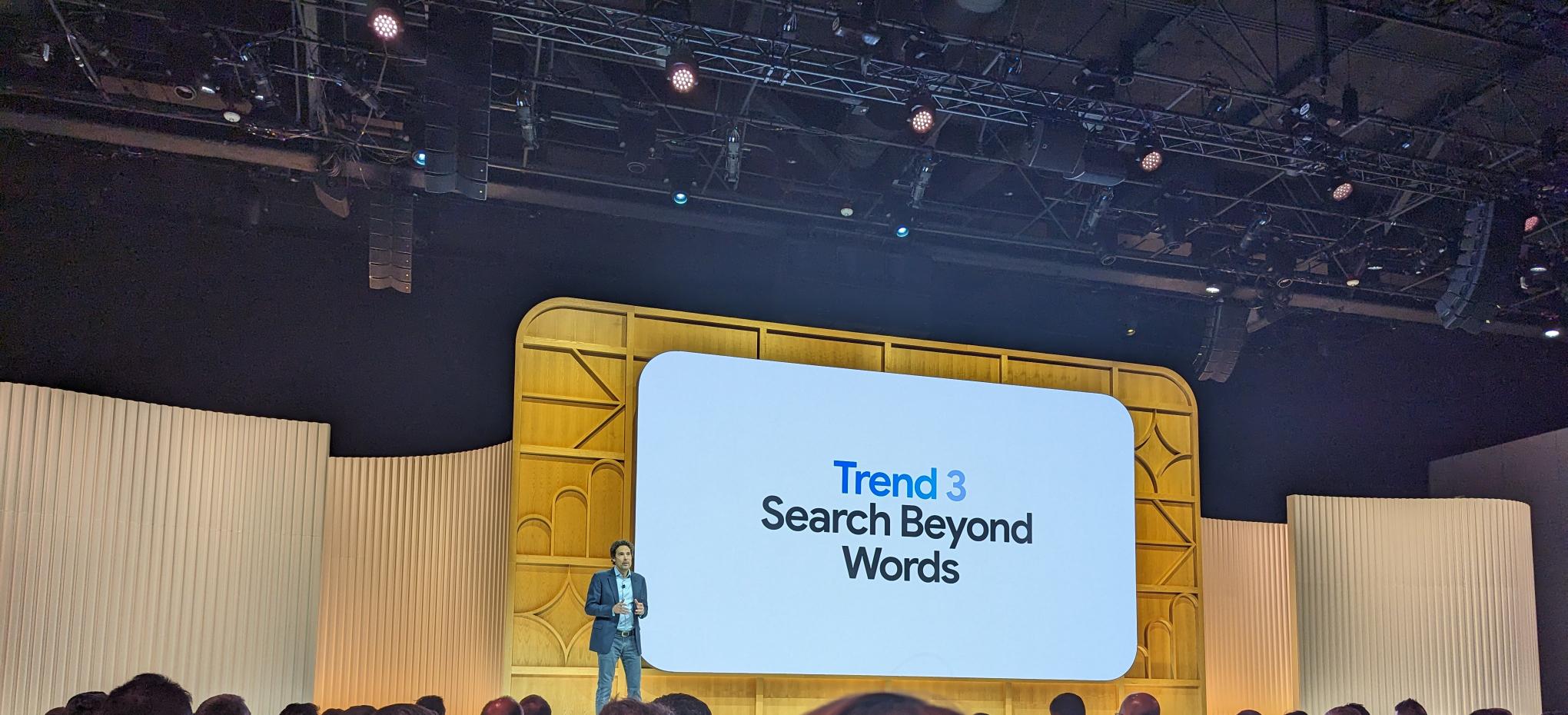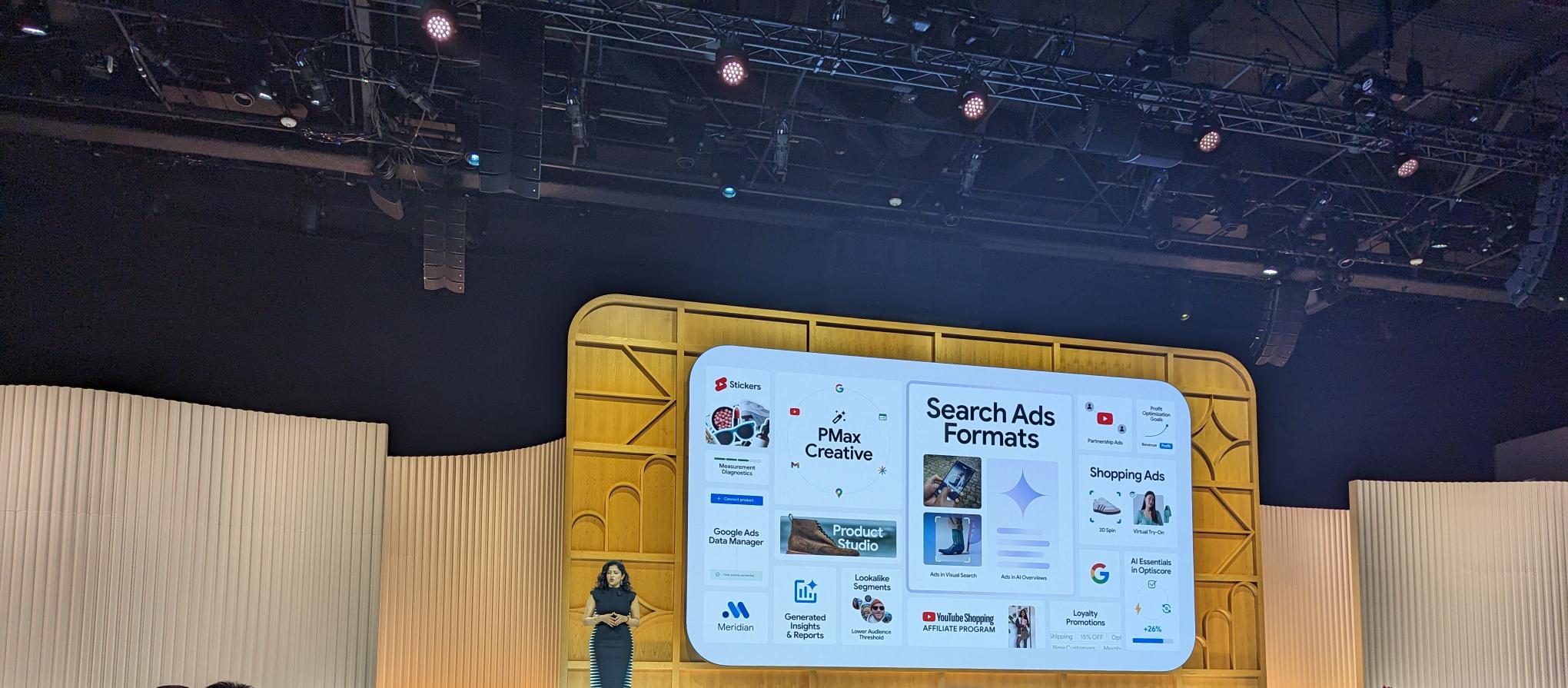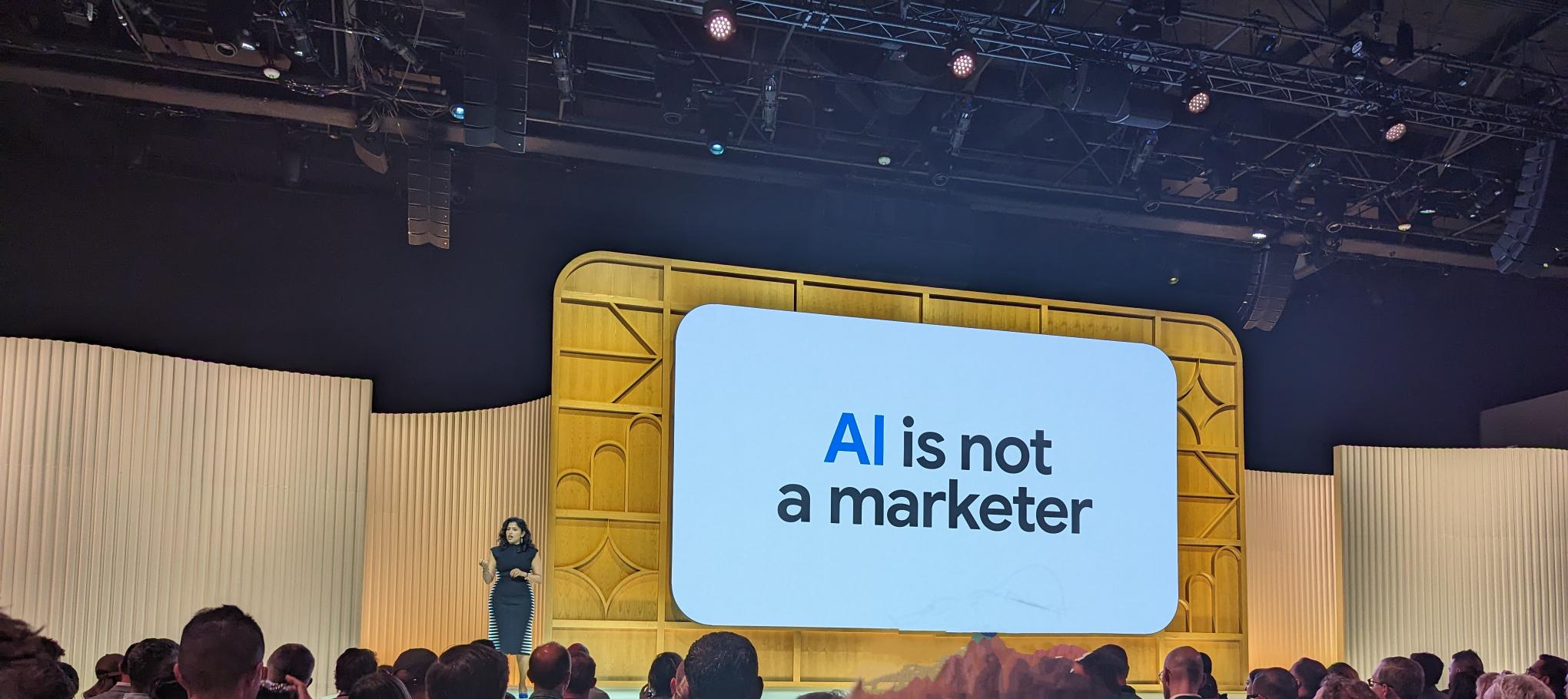After ten years of watching Google Marketing Live virtually from my computer, I had the opportunity to attend the event in person this year.
If you’re not familiar with it, Google Marketing Live is an annual event put on by Google that showcases its major product announcements for Google advertisers.
This year, Google unveiled 30 product updates for Google Ads! While not all of them were mentioned during the keynote, there was one core theme of the updates:
AI.
The majority of product updates can be categorized under these main components of Google Ads:
- Creatives.
- Media.
- Measurement.
Now that the event is over, I’ve had time to digest these platform announcements and really think about how to use them as an advertiser—or at the very least, what these updates can mean in the broader scope of marketing.
Below are my top product updates I’m most looking forward to in 2024.
AI Creative Announcements
As expected, Google announced multiple updates specifically around ad creatives and functionality for advertisers. These include:
- AI-powered image editing. Advertisers can edit images (including product feed). AI-generated images will appear in recommendations for Performance Max campaigns. Add and remove objects, extend backgrounds, and adjust image sizes to meet many sizes, orientations, and ratios.
- New brand standard guidelines. Advertisers can provide Google AI with brand guidelines, colors, and fonts. The option to upload example images as a reference point for the generative AI will also be available.
- Animated image ads for Demand Gen campaigns. If you have a Merchant Center account, you can serve animated image ads on YouTube Shorts and video ads. The animated images will be automatically generated from your product feed images.
- Integrations with creative platforms. Google now has partnerships with Canva, Smartly, and Pencil Pro to integrate into the Google Ads asset library. This means you can create assets on those platforms and export them to Google Ads.
As far as timing goes, not everything announced is available right away.
According to Google, the new brand standard guidelines will be rolled out in the later months.
Related: Google Ads: A Quick Guide To Every AI-Powered Ad Creative Feature (And What’s Coming Soon)
AI Media Announcements
During the live keynote, one of the most livening parts was Philipp Schindler’s demo with its generative AI technology.
It sparked imagination around non-traditional ways to search and interact to find new information.
 Photo taken by author, May 2024
Photo taken by author, May 2024With that comes some new ad space available for advertisers.
Some of the key media announcements within Google Ads include:
- Shopping ads to appear in Google Lens and Circle to Search. This is a new ad space and experience in the visual search results. Your shopping ad will showcase products when they’re relevant to the photos and screenshots users search with.
- Search and Shopping ads to appear in AI Overviews. Another new placement is unlocked – in the United States for now. Ads from existing AI-powered Search and Performance Max campaigns may be able to show in the AI Overview “Sponsored” section when they’re relevant to both the user search and the output from AI Overview.
- Conversational campaign creation. While this was announced last year, Google published more data showing that SMBs who use the conversational tool are 63% more likely to publish search campaigns with ‘Good’ or ‘Excellent’ ad strength.
- New loyalty promotions. Advertisers running Performance Max and Standard Shopping campaigns will have a way to tailor promotions like special pricing or member-only exclusive offers.
Similar to the creative announcements, not all these are live immediately.
Shopping ads and loyalty promotions will roll out over the next few months in visual search results.
By now, we’ve all likely heard some shocking outputs from AI Overviews. Google is starting this ad placement rollout as a small experiment in the United States and will take its learnings from all inputs to provide a better experience as it matures.
AI Measurement Announcements
While I thought there would be more hype around measurement improvements, there was only one brief callout about more in-depth reporting on Performance Max campaigns.
A more robust outline of measurement announcements included:
- Asset-level reporting in Performance Max. In the next few months, you’ll be able to see conversion metrics for each creative asset. This is a huge win for advertisers after years of being unable to report at this level of detail.
- Performance Insights in Merchant Center Next. More tailored recommendations and generated insights are coming to Merchant Center Next, along with conversational reporting requests, with more visual insights quicker.
- New audience signals in App campaigns. Another huge win for app advertisers! Advertisers can now link a wide range of audience lists, including first-party data audiences. Google AI will learn from the audience inputs to show ads to users more likely to convert.
- New Measurement Diagnostics hub. Advertisers can validate and troubleshoot any measurement setup within Google Ads. You’ll also see your measurement durability and readiness in this hub to build and activate first-party data audiences.
- Marketing Mix Models attribution. Google announced its newest open-source Marketing Mix Model (MMM), Meridian. It will help you measure the impact of your entire marketing strategy and make informed campaign decisions.
- Better iOS measurement with SKAdNetwork enhancements. New reporting updates are available across the Google Ads API and third-party app attribution partners, and a new beta is available to integrate your SKAdNetwork conversion value schema into Google Ads. This will help enhance any iOS app campaigns using tCPA or tROAS bidding strategies.
Summary: What This Means For Advertisers
In the short hour and 15-minute keynote, we were presented with a wide variety of new updates. As you can see below, these updates affect many different campaign types and are either available today or will be coming in the next few months.
 Photo taken by author, May 2024
Photo taken by author, May 2024So, with these updates, is there a larger theme at play?
In the grand scheme of the Google Marketing Live updates, a few major themes stood out to me.
1. Video content is key.
A lot of updates from Google Marketing Live revolved around content creation, automation, and animation.
Essentially, Google seems “all-in” on video content—specifically YouTube Shorts.
If you don’t incorporate video content into your marketing strategy, you may fall behind your competitors and see lower engagement.
Some advertisers shy away from video content because it seems tedious, too complicated, or insufficient resources.
With Google’s updates, anyone can start with video content from their phone. Google’s tools can turn images into video content.
Incorporating video into your Google Ads strategy can help you connect better with your target audience.
2. AI strategies are a must-have.
During the keynote, Google said, “AI is not a marketer.”
 Photo taken by author, May 2024.
Photo taken by author, May 2024.Basically, your jobs are safe right now, advertisers.
So, while AI is not a marketer, we marketers must have an AI strategy to keep up with these changes.
Trying to outsmart the Google Ads system or retaining too much control will prevent your campaigns from growing and scaling as they need to.
To have a successful AI strategy, think of a few of these main points:
- Always ensure the goal and measurement setup is correct.
- Set realistic bidding strategies so Google can learn from these inputs.
- Send appropriate signals to Google within your campaign setup.
AI outputs are typically only as good as the inputs it gets. That’s where you, the marketer, come in.
When used correctly and strategically, these new AI tools can help scale your workload, learn faster, and make more real-time decisions to optimize your campaigns.
You can find the full recap of Google Ads product announcements in the official article from Google.
Featured Image: Veroniksha/Shutterstock





![AI Overviews: We Reverse-Engineered Them So You Don't Have To [+ What You Need To Do Next]](https://www.searchenginejournal.com/wp-content/uploads/2025/04/sidebar1x-455.png)